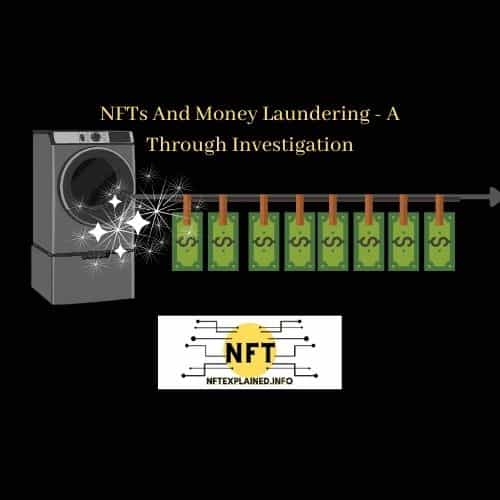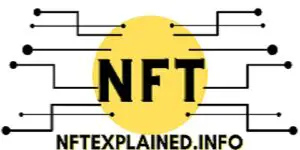
NFTs or non-fungible tokens are digital, blockchain based assets that allow owners to provide a receipt showing they own digital items. NFTexplained.info is a team of crypto investors who are well versed in the NFT space. In this article we will explore if NFTs are used in money laundering.
Let’s dive in.
There is no evidence that money launderers are involved with NFTs. While there is some risk – as with any industry in which meaningful money is exchanged – no laundering events have been documented. It’s plausible that a very, very small percentage of the NFT market involves money laundering.
To better contemplate this topic, we must first understand how money laundering works.
Money laundering is the illegal act of turning “dirty” (criminally sourced) money into clean money by making it look like the money has come from a legitimate income stream. As our team previously stated, money laundering is possible in any instance in which money is exchanged.
An example of money laundering is creating fake receipts from a store in which the receipts are fabricated and the payment is the illegal money. This makes the money look legitimate.
Money laundering occurs in the art world because art is quite subjective and large sums can be involved; it should be noted that some percentage of the NFT market is purely art-based which could make it appealing to money launderers.
NFTexplained.info previously noted that it’s likely that only a miniscule percentage of the NFT market involves money laundering as reports have come out that only 0.05% of crypto transactions are linked to money laundering.
Preventative measures may be more challenging to put in place since crypto and crypto based assets are decentralized, meaning no centralized party is involved. One measure financial authorities look at are abnormally high value sales that are not correlated to market trends. This can be challenging as the NFT market is often quite volatile.
When people think of abnormally high sales in the NFT space, many likely think of Beeple’s “Everydays: the First 5000 Days” as the piece was sold for an astounding US $69 million. That being said the piece was purchased by MetaKovan who is not laundering money but rather had large sums of crypto which he accumulated from investing in cryptocurrencies early on. If you would like to read about that sale, Beeple, and MetaKovan, click here.
A benefit that NFT or digital assets have in comparison to physical artwork is that almost all transactions happen on a permanent, public ledger (an immutable record keeping system). The most commonly used blockchain for NFT transactions is the Ethereum network; it has been reported that roughly 97% of all NFT-related transactions occur on the Ethereum blockchain.
While some blockchains are off chain or have transactions that are not recorded on a public ledger, it’s not common as the Ethereum network is used the most.
NFTexplained.info has also thoroughly covered additional topics related to manipulative or illegal activity in NFT marketplaces such as NFTs relation to pyramid schemes as well as NFT relation to wash trades.
In this article our team will cover if NFTs are made for money laundering, if OpenSea launders money, and if CryptoPunks are a form of money laundering.
Are NFTs Made For Money Laundering?
NFTs are not made for money laundering; NFTs provide proof that you own a digital asset via the blockchain. NFTs are made to allow creators to monetize their work without the need for a third party and to provide utility that was previously unavailible (e.g. an NFT acting as a ticket to attend an event).
The technology backing NFTs provide new possibilities for creators to monetize their work. For example, musicians no longer need to put their music onto third party sites that take a large percentage cut from each stream.
Instead, musicians can monetize their work by selling it as an NFT and can give the purchaser of their NFT album a percentage of the money that is made from the song being streamed.
NFT have a variety of utility, including the ability to be used in video games. Owners of blockchain-evidenced items can sell it on marketplaces. A good example of this is Axie Infinity, an NFT-based game that provides a full-time income for some participants. If you would like to learn about Axie Infinity and the play-to-earn phenomenon, click here.
Another form of utility NFTs provide is acting as a ticket to attend an event. For example, holders of the collection Top Dog Beach Club are promised to be informed of the whereabouts of a real world beach party in which only holders can attend.
Another example of this is the real world yacht party thrown by Bored Ape Yacht Club. In order to attend the party, people had to verify they owned an ape.
NFTs are also made to allow creators to interact with fans. E.g. holders of a collection could have the opportunity to talk to the creators – which could be famous athletes (i.e. LaMelo Ball) or influential people.
Aside from that utility, NFT projects also serve as a community for members. If you would like to learn about NFT communities and the impact they have on a project, click here.
Is OpenSea Laundering Money?

OpenSea is a NFT marketplace which does not launder money. The firm was recently valued at $13.3 billion. OpenSea makes money from service fees of 2.5% – taking $2.50 from a $100 transaction. OpenSea has security groups in place to prevent illicit activity.
OpenSea is the largest NFT marketplace and has received investments from large and widely respected venture capital firms like Andreessen Horowitz. Our team has covered the Series B funding round, and more information on that can be found here.
If you would like to read our teams guide on how to set up and begin using OpenSea, that article can be found here.
It should also be noted that the Financial Action Task Force (FATF) – an intergovernmental organization founded with the directive of combating money laundering – has deemed NFTs to not be VAs or virtual assets, depending on their characteristics. More information on that can be found here.
Eventually, platforms like OpenSea may be considered virtual asset service providers, in which case the FATF would be tasked with a deeper examination of any illicit activity happening in the marketplace.
Are CryptoPunks Money Laundering?
There are no documented CryptoPunk money laundering instances to date. CryptoPunks are 10,000 randomly generated pixelated characters; they started out as an experiment back in 2017 by Larva Labs. Now, many consider them to be the original NFTs and their historic significance contributes to their high price.
More information on CryptoPunks, including some of the famous people who own them, can be found here.
If you like our team’s content and would like to keep up to date with the fast moving NFT space, please follow us on Instagram & Twitter!

